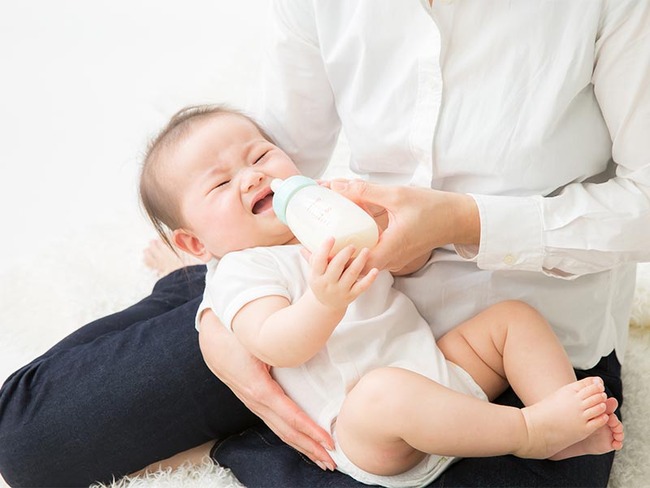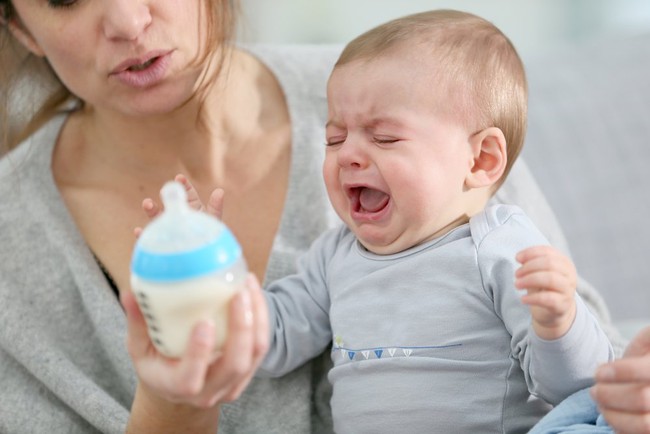Breastfeeding or bottle feeding is very good but suddenly does not want to breastfeed anymore, is the daily decrease in milk volume because the baby is tired?
In fact, young children suddenly don't want to breastfeed anymore, not because of what period they enter, the cause is often related to the mother's eating habits (if the child is breastfed), to the quality of the milk (the baby's breast milk). formula feeding) or many other reasons.

Reasons why babies suddenly don't like to drink milk
1. Curious
At a certain age, babies will be curious about everything around them, easily distracted, so they can't focus on drinking milk.
2. Like new things
As your baby accepts other foods and experiences new tastes, she will not only like breast milk/formula but will want to try other foods.
3. The eating environment is not good
The environment is noisy, easily disturbed, the baby wears too many hot clothes, the house is stuffy, the mother scolds and many other reasons make the baby feel uncomfortable, unable to concentrate on breastfeeding.
4. Growth rate slows down
As babies get older, their growth rate slows down, not as much as in infancy, so the baby's need for milk also decreases.
Basically, aversion to milk is physiologically more common, so it's best for parents to pay more attention, patiently observe and care. Depending on the child's condition, parents have an appropriate treatment.
5. Breast milk tastes bad
For breastfed babies, when there is a problem with breast milk, the mother eats some special foods that affect the quality of milk. This can cause the taste of breast milk to be different from before and that your baby doesn't like it.

In some special cases, the baby does not suckle or sucks very little due to medical factors, parents need to be alert, the common causes are as follows:
A food allergy (such as a milk protein allergy) or a food intolerance (such as lactose intolerance).
- Oral problems: Acute pharyngitis, mouth ulcers, thrush, ... causing pain in the mouth, children suddenly reduce eating, stop feeding.
- Respiratory tract infections cause stuffy nose, sucking baby can't breathe, fussy, irritable, don't like to suck.
Heart problems: Due to congenital developmental abnormalities in the heart, some babies will suckle less, cannot breastfeed, become tired and choke on milk after a few minutes of feeding.
- Fever, abdominal pain due to acute gastroenteritis.
- For some babies born prematurely, with low birth weight or children with many diseases after birth, it is necessary to carefully consider the period of low milk consumption.
How to take care of a suckling baby
Parents are always worried when their baby is tired of breastfeeding, hoping that this situation will soon pass. Doing whatever it takes to get your baby to breastfeed is a choice most parents will make. Here are some suggestions for parents to consider:
- Adjust and improve the eating environment
The important thing when dealing with a lazy baby is not to force the baby at all costs, this only backfires, making the baby more disgusted and lazy to suckle.
At this time, mothers should pause breastfeeding and try again when the baby's mood is happy. A comfortable atmosphere will help your baby increase his appetite.
- Flexible arrangement of breastfeeding time
Long-term fasting may not work for some babies. The mother can divide into many feedings for the baby, although each feeding may be less, but when feeding many times, it will partly meet the amount of milk needed for the baby's body.
- Seek the help of a doctor
Each child is an independent individual, the parenting environment of each family is also different, so the reason why each child has a "milk hate" expression may also be different.
What parents need to do now is to ask for the help of experts, together to analyze to find out exactly the reason why the baby hates milk.
In short, lazy baby to suck milk is a common condition in the process of raising a child, so parents need to calmly handle it. Any treatment that is coercive, forced, or hasty can make the baby afraid and lazy to suckle, parents need to pay attention.






